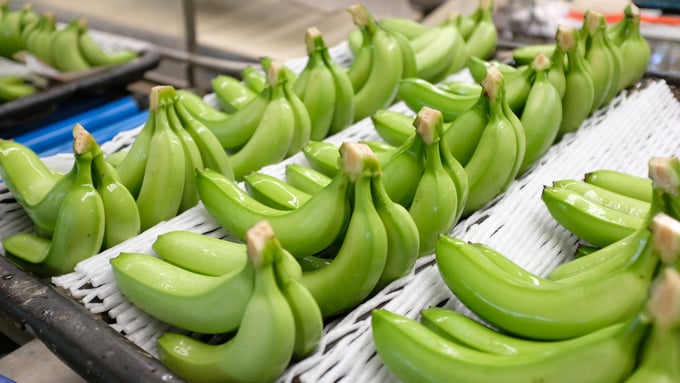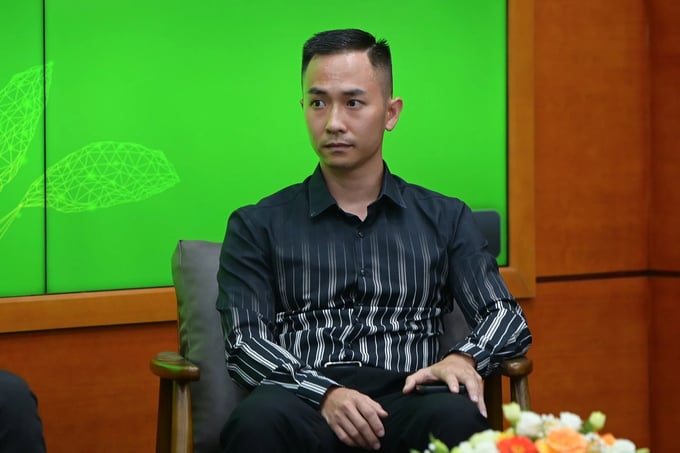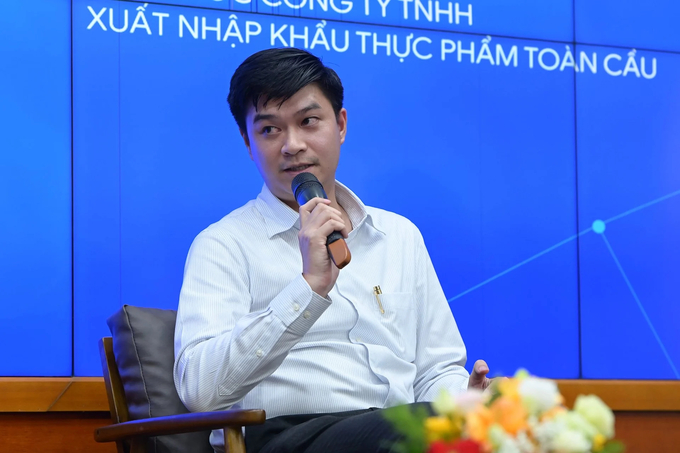November 27, 2025 | 02:08 GMT +7
November 27, 2025 | 02:08 GMT +7
Hotline: 0913.378.918
November 27, 2025 | 02:08 GMT +7
Hotline: 0913.378.918
On July 10, the Ministry of Agriculture and Rural Development organizes a forum to connect agricultural science and technology products with businesses, cooperatives, and the public. Vietnam Agriculture News kindly introduces our readers to insightful conversations in the forum.
Vietnam Banana Cooperative (Viba) is the largest and most reputable banana producer in Northern Vietnam. The Viba trademark has been registered for exclusive protection with the Department of Intellectual Property. This variety, known for its high and consistent quality, was researched and developed by the Central Fruit and Vegetable Institute. It is grown on farms in Hoa Binh and Hung Yen, following the VietGAP cultivation process.

The Vietnam Banana Cooperative has connected with other businesses to manage the purchasing, growing, processing, and preservation processes. Photo: Quynh Chi.
Mr. Tran Trung Duc, Chairman and Director of the Cooperative, was asked how the Cooperative learned about the Viba banana variety from the Central Fruit and Vegetable Institute and developed it to its current success. Additionally, what science and technology applications has the Cooperative utilized for its development? And has Mr. Duc made any specific requests to scientists?
Mr. Tran Trung Duc replied that all of the Cooperative's members in Hoa Binh face conditions significantly less favorable than their competitors. The key to their survival has been the application of science and technology. The first product from Viba Banana Cooperative that integrated science and technology was banana vinegar. In 2015, concerns arose about the use of chemicals in composting bananas and other fruits, which frightened consumers. Mr. Duc, involved in the banana business at that time, sought foreign literature for solutions, not expecting to find any useful Vietnamese documents. However, upon discovering relevant Vietnamese documents, he immediately had the Cooperative apply the knowledge.
“We started as a fruit supply business, so we understand the market. Once we achieved good sales, we turned our focus to developing the growing area. The first variety we adopted was the non-GMO tissue-cultured pink banana. This variety, researched and produced by the Central Fruit and Vegetable Institute, is known for its high and uniform quality,” Mr. Duc stated. Currently, pink pepper bananas are cultivated on farms in Hoa Binh and Hung Yen, adhering to the VietGAP growing process.
Mr. Duc shared that after about two to three years, banana trees on old land will lose productivity. The cooperative has established additional companies to address this, connecting with other businesses to manage the purchasing, growing, processing, and preservation processes.

Mr. Tran Trung Duc, Chairman and Director of the Vietnam Banana Cooperative shared its vision to apply high technology in production. Photo: Tung Dinh.
“Bringing a product to market is a long process, and ongoing communication with scientists is essential. When consumers change their requirements, businesses must adapt accordingly. Scientists are crucial for making these adjustments. They are true companions, not just contractual partners,” Mr. Duc emphasized. “We also aspire to reach the global market, not just the domestic one. As a small business with limited capital, time, and resources, we need sample products from research institutes to quickly adjust and meet customer needs."
Dr. Nguyen Duc Hung, Director of Global Food Import-Export Co., Ltd., was asked to share more about how businesses connect to implement science and technology and what specific orders the company has placed with scientists.
Dr. Nguyen Duc Hung explained the current situation: businesses and the public have many ideas and products, but manufacturing businesses have yet to meet these needs, and scientists lack access to necessary information. The company has partnered with research institutes and universities to undertake projects, including reducing bitterness in orange juice and clarifying banana juice. The aim of this research is to help fruit juices retain moisture and have a longer shelf life at room temperature, catering to consumer needs.
According to Mr. Hung, this concept is widely developed in the global beverage industry, while it is still emerging in Vietnam. He also mentioned that the company has linked agricultural production with farmers, creating intermediary products for processing. However, establishing stable raw material areas is challenging, especially for northern businesses. Mr. Hung advocates for improved policies and training for farmers and businesses to overcome these limitations.

Dr. Nguyen Duc Hung, Director of Global Food Import-Export Co., Ltd, shared the specific needs the company has placed with scientists. Photo: Tung Dinh.
He also expressed hope that Vietnam can develop vegetable varieties such as soybeans to meet the world's growing demand, while domestic seed sources are limited and difficult to develop.
Regarding coordination between people, businesses, and scientists, Mr. Hung proposed a forum for farmers and businesses to exchange ideas. Scientists can base on these ideas to develop practical research. Vice versa, when research is deployed and published on that database, farmers can find out information and proactively approach it.
“In fact, people and businesses are not interested in research results in general because the benefits for people and businesses usually unclear. It is necessary to be transparent about the appraisal of the standard system so that when products are brought to the market, they can help businesses increase product value," Mr. Hung proposed.
Translated by Quynh Chi
/2025/11/26/4909-2-154329_878.jpg)
(VAN) Pearl grouper farming in HDPE cages not only delivers economic efficiency but also contributes to protecting the environment, creating jobs, and promoting marine-based experiential tourism.

(VAN) The model of making a living under the forest canopy through the agroforestry system in Van Son commune, Bac Ninh province, is expected to generate an annual income of approximately VND 30 million/ha.

(VAN) Many enterprises in Can Tho are harnessing natural energy and reducing greenhouse gas emissions in their production processes, thereby contributing to the promotion of a sustainable green transition.
/2025/11/24/3536-2-112800_176.jpg)
(VAN) Dong Nai now has tens of thousands of hectares of forests certified for sustainable management, and this area will continue to be expanded in the coming period.

(VAN) Vinh Ha hamlet (Dai Xuyen commune, Hanoi) is shifting away from small-scale farming as households adopt bioscurity into their breeder chicken models.

(VAN) Heavy rains make aquatic species more vulnerable to disease. Proactive water management and high-tech systems help farmers prevent outbreaks and protect yields.

(VAN) Greenhouses are shifting production mindsets in Binh Lu commune, enabling farmers to ‘weather the sun and rain’ and secure stable vegetable harvests throughout the year.